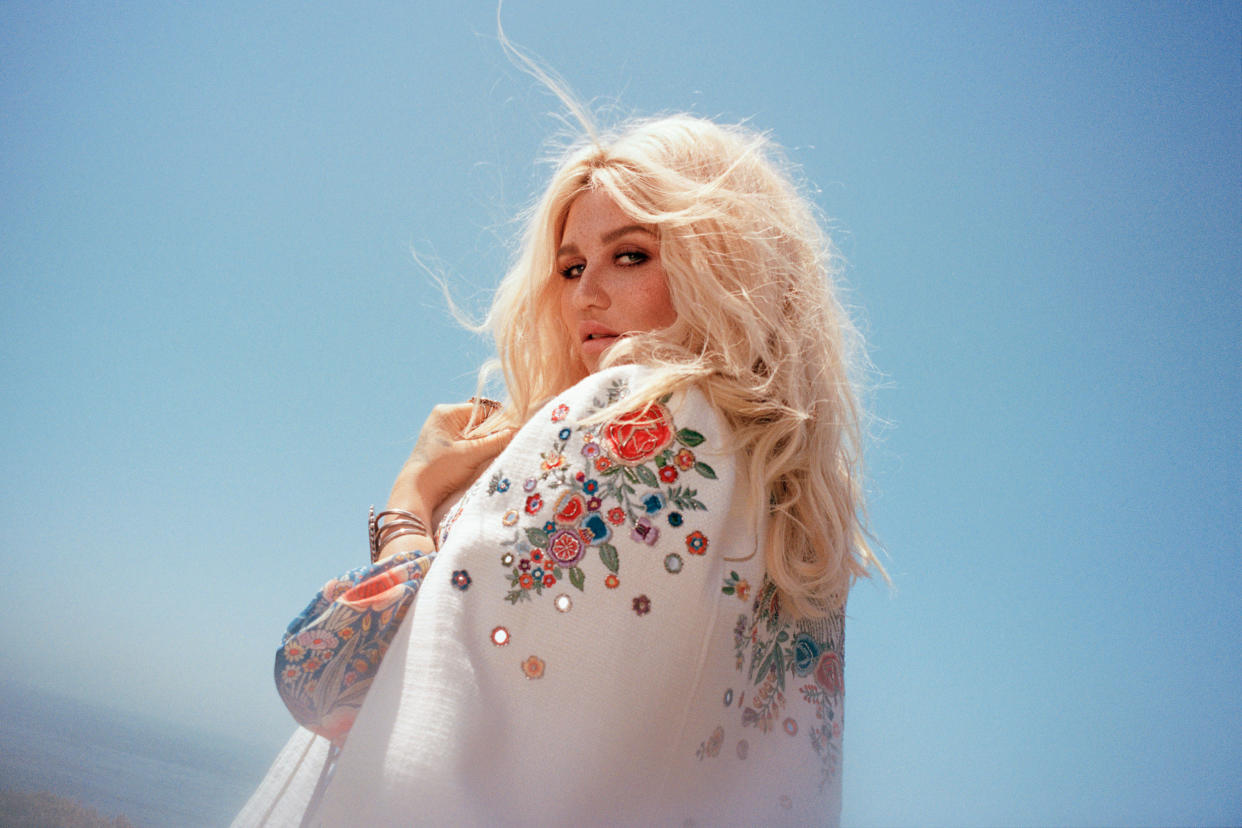'Rainbow' connection: Kesha shows her true colors on glorious comeback album

Last month, when Kesha released her gospel-inflected, Grammy-baiting comeback single, “Praying” — the sort of triumph-of-the-spirit fight song best reviewed with a string of raised hands and fire emojis, and an obvious takedown of her former producer/label boss Dr. Luke, whom she claimed in a messy 2014 lawsuit had sexually, physically, and emotionally abused her for years — it was fascinating to hear her struggle to make peace with her past during the power ballad’s demon-exorcising three minutes and 50 seconds. Somehow, “Praying” worked as both an Alanis-level revenge rant and a conflicted expression of a victim’s compassion for her tormentor, and it was the realest, rawest, finest music the 30-year-old embattled pop star had ever recorded.
Now, as Kesha returns with her third album, Rainbow, it seems that the worst thing to ever happen to her career (she hasn’t been able to release a full LP since 2012) has brought out her best. This proud, bold new collection of outsider anthems and I-am-woman-hear-me-roar statement songs effectively shifts her brand from party Animal to real-life Warrior, from the instant it opens with “Bastards” — a gentle, ragged, alt-country ditty which, with its familiar refrain of “don’t let the bastards get you down,” almost seems like a sweet, sly nod to country outlaw Kris Kristofferson.
Related: Kesha Says Recording New Album Was ‘Way to Cope’ With Depression
Kesha’s country roots actually run deep — those rhinestone-studded Nudie suits she’s been rocking lately aren’t just for show — and one of the loveliest tracks on Rainbow is “Old Flames (Can’t Hold a Candle to You),” a twangy weeper co-written by her mother, Pebe Sebert, that originally was a hit for Dolly Parton in 1980 (Merle Haggard also recorded it in 1985). Parton duets with Kesha on this 2017 version, and as their lilting, bell-clear voices blend beautifully against a backdrop of swirling psychedelia and wailing pedal steel, it truly feels like a torch-passing moment. Who would have thought that the good-time girl who once bragged about brushing her teeth with a bottle of Jack would one day become the new outlaw-country queen of cry-in-yer-beer balladry?
Related: Kesha Reflects on Eating Disorder, Recovery During Emotional SXSW Conversation
That being said, Rainbow isn’t all scorched-earth, woman-scorned confessionals and sad country laments. The biggest, and most welcome, surprise here is that the rambunctious wild child behind those old club bangers like “Take It Off” and “Die Young” is still alive and well — in fact, she seems to be having more fun than ever. Far from having her spirit crushed by the hardships of recent years, Kesha sounds like she’s having the time of her life on Rainbow, even randomly breaking out in giggle fits throughout the album, like Jimmy Fallon and Horatio Sanz in some amusingly derailed SNL skit.
Related: Read Kesha’s poignant essay about celebratory new song ‘Woman’
A pair of feel-good collaborations with scuzz-rockers Eagles of Death Metal — the delightfully attitudinal and expletive-laden cheerleader chant “Boogie Feet” and the exuberant new wave fist-pumper “Let ‘Em Talk” (basically the greatest ’80s sitcom theme Kim Wilde never recorded) — will have listeners, to quote the former tune, dancing like motherf*****s. “Woman,” a raunchy, skronky burlesque workout featuring the late Sharon Jones’s Dap-Kings Horns, is destined to become a high-rotation party playlist favorite at bachelorette bashes, strip clubs, and drag revues around the world. And the breezily Bedingfield-esque/CW-soundtrack-worthy “Learn to Let Go,” finger-snapping New Jack slow-jam “Hymn,” and (back to the country vibe) knee-slapping hootenanny “Hunt You Down” all prove Kesha still knows how to get the party started. The difference now is instead of being the “Tik Tok” girl who chases boys who look like Mick Jagger, Kesha is channeling Mick Jagger — meaning she’s a real rock star now.
“I know I’m still f***ed up … but our scars make us who we are,” Kesha warbles on Rainbow‘s title track. In this case, those scars helped make one of the great pop albums of the year.
Follow Lyndsey on Facebook, Twitter, Instagram, Google+, Amazon, Tumblr, and Spotify.

